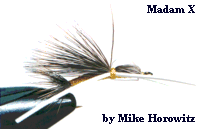Madam-X

Tied by Mike Horowitz, aq108@freenet.carleton.ca
There had been a discussion concerning this fly on the list, and
about the same time I discovered the patterns on LJ's home page,
so that's where I went to find a pattern. I almost went 100% by
Jim Caldwell's instructions, which are reprinted below, and
annotated by me (in parenthesis).
PATTERN:
Hook: 3X long dry fly (TMC 200R)
Thread: Florescent Orange (Mike's note -I used Florescent Yellow
to match the body)
Tail: Elk
Body: Orange floss ( Mike's note - I used Florescent Yellow)
Wing: Elk -- tied bullet head style (will explain in the body)
Legs: White rubber hackle
Tying Instructions:
1. Cover the hook with thread. Stack the elk to even up the ends
and select a bunch not quite the diameter of a match-stick. Tie it in
about 2/3's of the way down the shank from the eye. The tail should
be about as long as the hook gap. Wrap the thread back towards
the rear and then cut the hair by lifting it up and cutting it off on a
slant. The hair should not be allowed to rotate on the hook -- it
should be tied in on the top. Tie the cut ends down tight trimming
any stray bits off -- this will keep the hair from rotating on the
hook.
2. Wrap the thread back toward the rear and cinch it down so the
hairs flair a bit spreading the tail. Select another bunch of hair -- a
bit more (maybe 15% more) than you used for the tail. It will be
tied in so that when it's cut off (using the same slant cutting
method) the ends will meet the cut ends of the bunch used for the
tail [Mike's note: the fly-tying police will not beat down your
door if they don't meet exactly - the floss will cover a multitude of
sins]. Tie this bunch in so that the hair extends 2/3 of a hook length
or a bit more in front of the hook eye.
3. Wrap to the head area but leaving enough room so the hook eye
is not crowded. While tying it in do not let the hair rotate around
the hook. Now go back over the entire body making sure the
entire thing is well cinched down.
4. Next, tie in a strand or two of orange floss (8" to 10") and wrap
the body from front to back evening out any gaps between the two
bunches of hair [Mike's note on handling the floss - my floss came
in 4 strands - I used only one for better control; also, moisten the
floss after tying it in or else the strand will attempt to further
separate]. Tie the floss off about 1/3 back from the head but do not
clip it off yet, there should be about 2" or 3" of floss left - cut
it off; in one or two winds, move the thread back along the body
about 1/3 the distance back from the head.
5. When you are done with this step there should be a flared hair
tail, a long smooth uniformly thick body of orange floss, and a
bunch of hair sticking up and out at the head, slightly flared
but tied to the top of the hook. A piece of floss (at least 3") should
be left hanging 1/3 back from the head. Your tying thread should
be just in front [see Mike's previous note]. Now you tie the
bullet head. Actually it's not really a bullet head since you only
want the hair on the top half of the hook. This leaves the floss
body visible from below. Stroke the hair back being sure it is not
under the hook. Now, using the thread, tie the head down. This
should be done about 1/3 of the way back from the head. If
everything goes correctly you should be able to flair the hair so the
wing stands up and sticks out a bit. Cut two rubber hackle legs.
They should be about as long as the hook shank. Tie them onto the
sides at the same tie down point used for the bullet head.
6. Cinch down so that they bend outwards, each one forming a V,
the two together forming an X. Wrap the tie down point with the
floss [Mike's note - remember, we cut the floss earlier, so simply
whip finish using the thread] and tie the floss off with the tying
thread. Tie off the thread by whip finishing at the tie down, this
makes it unnecessary to try to get the thread back to the head to tie
it off. A Matarelli makes whip finishing easy.
Tying note:
Right now I'm tying on size 14 TMC 200R's so these tying
instructions are tuned for that size but other sizes are good and any
3X long hook should do. The gap on the 200R's is awfully small so
for tying sizes smaller than 14's I recommend using a 2X long hook
one size up and just tie the fly smaller. This way you don't end up
with an absurdly small hook gap.
How to fish this animal:
A nice fall day, with the kids back in school (so they have to do
homework and aren't running along the bank, scaring the fish), and
leaves in the water, blocking the flow, causing the water level to
rise. The grass has stopped growing, so you have no responsibilities
in that area. The day is yours. How should I know? I'm a chuck it
and chance it FF'er, although Mike Fisher and Claude Freaner have
both helped me this summer to THINK before casting. I have found
that floatant keeps this beast on the surface where the legs seem to
be more active. Without floatant, the legs twitch nicely if you give
small jerks; you'll see what I mean.
BACK TO TFS

